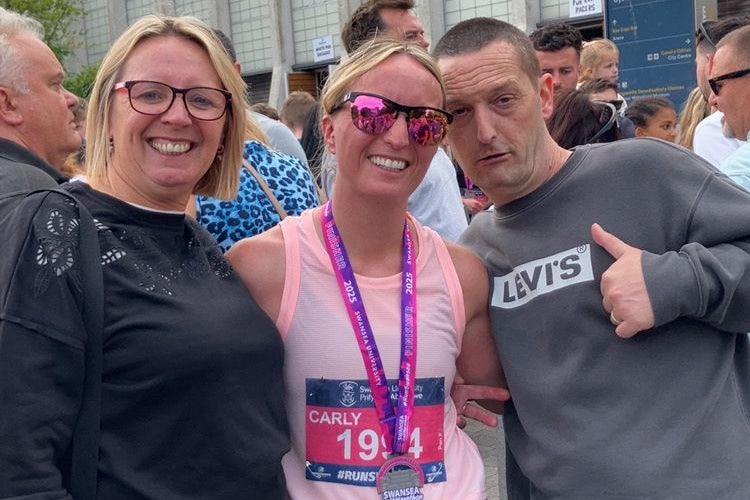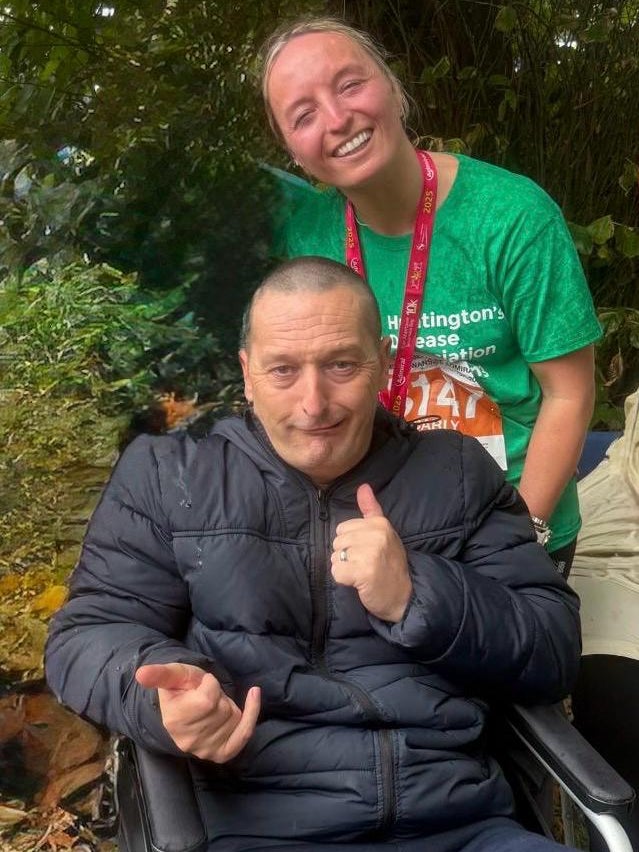As soon as I finished with work yesterday and turned my phone back on, it blew up with messages. One of the cruellest and most devastating diseases – Huntington’s – has been successfully treated for the first time. A breakthrough, a word I’d been desperate to hear for what felt like for ever. Everyone close to me could see how massive this was.
After living in the shadow of this devastating disease for so long, it’s been hard to let hope in, even when it’s finally knocking at the door.
Huntington’s disease, what we call HD, doesn’t just touch your life; it consumes it. Most people don’t know what it is, or just how devastating it can be. But I’ve always known. I’ve lived with it all my life. My auntie died from it. My grandad, too. My dad is battling it right now, and I care for him. And me? I tested gene-positive almost five years ago now.
A life impacted by HD is like living under a storm you can’t escape. It strips away movement, memory, personality. It’s like dementia, Parkinson’s, and Motor Neurone Disease rolled into one cruel diagnosis.
So yes, hearing this news was overwhelming. As a gene carrier, I’m torn in two. There’s a sadness so deep I can’t put it into words, knowing that it’s too late to help my dad. But there’s this newfound hope – for me. I have had so much anticipatory grief for my future in these last few years – where you grieve for someone who is still alive – and now there’s brightness amid the dark.

I knew how incredibly proud and happy my parents were to hear this news, and when I let myself feel that, I couldn’t hold back the tears. Because who wouldn’t cry at the thought that life might not be as short, or as awful, as they had once believed?
I’m 32. Symptoms usually show up in your late thirties or early forties. Until now, I’ve lived with a ticking clock inside me. The future has always felt like a cliff edge. But today, for the first time, I can imagine that cliff being pushed further away. A little more time. A little more life. That’s everything.
Watching my dad get worse has been the hardest part. His first symptoms were the involuntary movements – the chorea – that most people associate with HD. Now, it’s his memory, his thinking. The cognitive decline is what’s so difficult. My anticipatory grief is for him, too, because he isn’t the dad I grew up with any more.
That loss is constant, relentless. And yet, he still finds ways to show me love every single day. He tells me how proud he is, how much he adores me, and that never goes away. Dad is my biggest inspiration in life, a warrior who continues to fight back and try his best every single day.

It was when he tested positive that the full impact of what Huntington’s meant truly hit me. I’d always feared I was too much like him, and deep down, I knew I’d have the gene, too. The genetic testing process is long, full of counselling and questions about whether you’re “ready”. But the truth is, nothing prepares you for hearing the result.
The moment the words are spoken, your life divides into before and after. You can never unhear it. And yet, beyond that moment, there’s barely any support. That’s why I’m training to be a psychotherapist. My own experience pushed me onto this path. My dissertation is on aftercare for people like me, because no one should have to face the fallout of a diagnosis alone.
I’ve struggled. I’ve grieved for a future I thought was already written. But advocacy gave me a voice and a purpose. I’ve thrown myself into awareness work, determined to make things better for the next person who gets that life-shattering result. I’ve found community through organisations like the Huntington’s Disease Association and the Huntington’s Disease Youth Organisation. They’ve given me hope, friends, and a sense of belonging in a world that can otherwise feel so isolating.
And I’ve set myself challenges – next year, I am actually running the London Marathon. Partly to prove to myself that I can, and partly because I don’t know for how long I’ll be able to. And mostly for my dad, because I know he will be there, cheering for me every step of the way. That image alone is enough to carry me through. I want to raise as much as possible to support other families like mine around the UK who are affected by HD, because I know how much it is desperately needed, while raising awareness of a condition that not enough people know about.
This breakthrough doesn’t erase the pain of the past. It doesn’t undo the loss. But for the first time in my life, it feels like the story might not end the way I’ve always feared. For the first time, I feel a little light breaking through the darkness.
Carly Evans is running the 2026 London Marathon for the Huntington’s Disease Association







